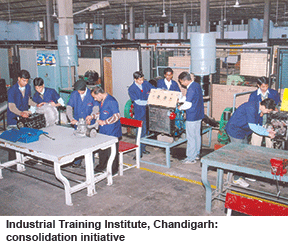THE 60-DAY-OLD narendra Modi-led NDA-II government is set to consolidate all skill development programmes currently administered by 21 ministries and departments of the Central government, under a newly-created Union ministry of skill development and entrepreneurship (SDE). With the Union Budget 2014-15 presented to Parliament by finance minister Arun Jaitley on July 10, having allocated an aggregate sum of Rs.25,000 crore for skill development initiatives, the impact of this decision could be enormous.
 Last year (May 2013), the previous Congress-led UPA-II government had established the National Skill Development Agency (NSDA) by amalgamating the prime minister’s National Council on Skill Development, the National Skill Development Coordination Board and the office of the adviser to the PM on skill development, to coordinate and harmonise the skill development efforts of the government and private sector to achieve the skilling targets of the 12th Plan and beyond. Among NSDA’s other objectives: operationalising the National Skills Qualifications Framework (NSQF) and becoming the nodal agency for sector skills councils and bridging social, regional, gender and economic divides in skilling.
Last year (May 2013), the previous Congress-led UPA-II government had established the National Skill Development Agency (NSDA) by amalgamating the prime minister’s National Council on Skill Development, the National Skill Development Coordination Board and the office of the adviser to the PM on skill development, to coordinate and harmonise the skill development efforts of the government and private sector to achieve the skilling targets of the 12th Plan and beyond. Among NSDA’s other objectives: operationalising the National Skills Qualifications Framework (NSQF) and becoming the nodal agency for sector skills councils and bridging social, regional, gender and economic divides in skilling.
In a further development, the office of the director-general of employment and training (DGET) under the Union labour and employment ministry, which supervises the country’s 5,114 industrial training institutes, and other vocational training programmes, will also be shifted to the new SDE ministry for which a minister — Sarbananda Sonowal, MP, representing the Lakhimpur constituency in Assam — has been appointed. Moreover, the National Skill Development Corporation (NSDC, estb. 2009) — a public-private partnership to fund private sector VET (vocational education and training) firms — currently reporting to the Union ministries of finance and small and medium enterprises, will also be merged with the SDE ministry. Ditto the National Rural Livelihoods Mission of the Union HRD ministry and the Ajeevika programme of the rural development ministry.
This consolidation of disparate skill development programmes under the Union SDE ministry is to realise prime minister Narendra Modi’s goal of improving youth employability through his “skills, scale and speed” formula to get the economy back on track. Every year, 12 million youth enter the workforce, but majority of them lack employability skills. Therefore the new government is determined to achieve the target set by the predecessor Congress-led government of skilling 500 million people by 2022, when India will be celebrating its 75th year of independence.
Navin Bhatia, an alumnus of DMT, Mumbai and IMT, Ghaziabad and promoter-director of the Delhi-based Navkar Skills Pvt. Ltd (estb. 2011) which has set up 34 skill development centres in Bihar and Assam, welcomes the creation of a new SDE ministry as “long overdue”.
“However establishing the new ministry is only the first step. Within the ministry, joint secretaries need to be given charge of setting skill qualifications or NOS (national occupation standards); developing trainers and assessors; devising an apprenticeship system including passing the imminent Apprenticeship Act; collecting labour market intelligence to match training with demand, and creating entrepreneurs with market linkages. Only if attention is paid to the details of operationalising the SDE ministry, will this initiative serve its purpose,” says Bhatia.
One of the major infirmities of central planning and post-independence India’s national development effort is impatience with details. Contemporary study programmes need to be carefully structured, teachers who can implement syllabuses/curriculums need to be trained, assessors drawn from industry need to be found, and the native spirit of enterprise has to be revived if the new ministry is to serve any purpose other than creating unproductive employment.
Autar Nehru (Delhi)